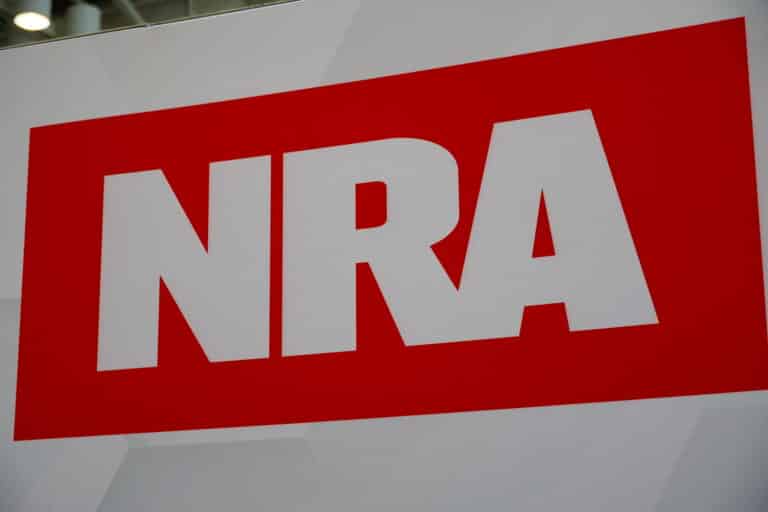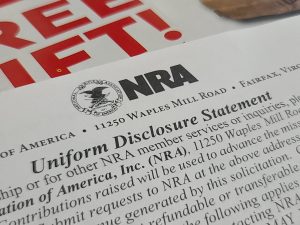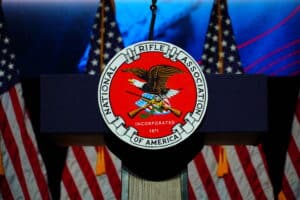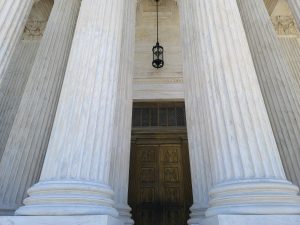New York Supreme Court Judge Joel Cohen filed a judgment on Wednesday in the state’s civil corruption case against the National Rifle Association (NRA), finalizing numerous reforms the group will be required to implement.
Cohen’s judgment keeps the gun-rights group intact and free of a government overseer but forces it to institute a series of reforms to prevent executives from misusing funds. Among those is a ban on some longtime NRA leaders serving on the group’s audit committee, a new process for board elections, a new committee to implement further reforms, and new protections for internal watchdogs. The judgment also cemented the $6.35 million penalty former executives Wayne LaPierre and Wilson “Woody” Phillips owe to the gun-rights group.
The judge barred LaPierre from any leadership role with fiduciary responsibility at the NRA for ten years as well.
The order likely ends the half-decade-long legal ordeal the nation’s largest gun group has endured. While the NRA avoided the most severe punishments sought by New York Attorney General Letitia James (D.), including outright dissolution, many of its longtime leaders have been forced out of key roles or the organization entirely, with many regular members also heading to the exits over the scandal. Still, the resolution of the lawsuit and internal reforms could allow the NRA to move on to rebuilding.
Both the AG and the NRA declared victory in the wake of Cohen’s ruling.
“For decades, the NRA let self-interested and self-dealing insiders run the organization with complete disregard for the rule of law,” James said in a statement. “As a result of my office’s efforts to stop corruption at the NRA, the NRA has been forced to clean house.”
“The NYAG sought to shut us down, and then appoint outsiders to oversee management of this historic organization,” NRA President Bob Barr countered in his own statement. “Fortunately for freedom lovers everywhere, this politically motivated attempt failed. The NRA remains strong, safe and independent – continuing to protect freedoms.”
Neither party announced plans to appeal the decision. However, lawyers for former NRA Executive Vice President Wayne LaPierre and former Treasurer Wilson Phillips did not respond to a request for comment.
Some of the most consequential reforms instituted by Judge Cohen impact the NRA’s board of directors.
One major focus of the trial was the NRA’s Audit Committee, over which very few NRA insiders had direct oversight of the organization’s internal controls. Judge Cohen ordered that no director who served on the Audit Committee from 2014 to 2022, which he said were “the years during which the jury found violations of law occurred,” be allowed to serve on the committee again.
That ends an era of control for some of the NRA’s most recognizable names, such as former NRA President Charles Cotton and longtime board member David Coy. However, they can continue serving in other roles on the board.
Still, Cohen rejected the AG’s attempts to implement a similar ban in some of the NRA’s other key committees. He also accepted the NRA’s proposal for a new “Director Nomination Policy,” which requires the group to nominate 20 new director candidates each year.
In addition to Cohen barring LaPierre from serving in a leadership role, the AG previously reached an agreement with Phillips to forfeit his ability to serve as a fiduciary of any not-for-profit in New York for 10 years. She also reached one with former executive Joshua Powell, who agreed to a smaller payment and a permanent bar.
Judge Cohen ordered the $4.35 million owed by LaPierre and the $2 million owed by Phillips will accrue a nine percent interest rate dating back to the jury trial’s verdict in February. The defendants won’t have to pay the trial expenses despite the AG’s request.
The judge ordered LaPierre and Phillips to pay restitution directly to the NRA instead of going through the AG’s office first. However, the judge also ruled that the NRA can not settle with its former executives for less money than the jury determined it is owed unless it gets court approval ahead of time.
Cohen’s order also mandated that the NRA further commit to some reforms the group has already begun implementing. Those reforms, implemented in response to concerns of “entrenchment” by its longtime leaders, aim to increase internal transparency and expand input on the group’s functions to more NRA members. They include enabling electronic access to internal information, such as financial filings, internal audits, board member committee assignments and contact information as well as the group’s bylaws and policies.
One of the disclosures will be for first-class and charter travel expenses, a major source of negative publicity for the NRA. The AG sought to have these posted on the NRA’s public website, but the NRA will instead have to publish them in a recurring “Compliance Report to Members.”
The judgment also mandated the group set up an online portal for NRA Directors to remotely access confidential documents, which some dissident board members had long complained leadership intentionally kept difficult to access.
The AG also sought to compel the NRA to hold a referendum on shrinking its 76-member board. Instead, the judgment creates a “Committee on Organization,” which will consider the “voice of the members” as it evaluates the board’s size, protocols, and scope. Ultimately, the committee will make recommendations for improving the NRA’s internal operations at its April 2025 meeting.
Judge Cohen also ordered the NRA to appoint an independent consultant to advise on best practices as it implements these reforms. Rather than reporting to the AG and sharing internal information, as the office originally sought, the AG will have 14 days to offer comment on the NRA’s nomination of a consultant, which Cohen will then approve.
The remaining reforms focus on taking additional steps in its annual filings. For instance, the NRA’s EVP and Treasurer must certify that the group’s CHAR500 and 990 filings have “no misstatements or omissions” for at least the next five years.






